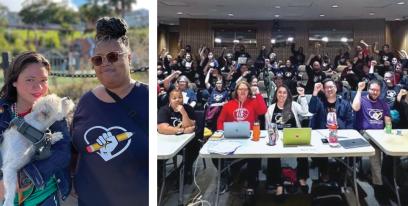I’m a dropout prevention specialist by trade—or by calling. I’ve always been supportive of those who look like me and come from a similar background. I am an African American mother who grew up in public housing in the Western Addition of San Francisco. I was raised by a single mother and had three younger siblings. At 16, I started working at a nonprofit called Operation Contact; we provided academic coaching and recreational activities. I was also an advocate for one of my brothers who needed an individualized education program (IEP) but was not identified until age 18. Being able to support families in navigating the different systems is important to me because my family didn’t have that. I’ve also experienced trauma in my life, including the murder of one of my brothers; that binds me to the type of children I work with.
I was part of the UESF executive board back in the early 2000s, but I was also a young mother; I couldn’t give my all, so I stepped down. Many years later, once my son was in college, a young person I had supervised asked if I would join a slate and run for office as UESF’s sergeant-at-arms. The entire slate was elected. Then, two years ago, our vice president of paraeducators had to step down, and I was voted in by the executive board to replace him.
Back in December 2022, I was asked to do an opener for our bargaining team kickoff. At registration, we were all given whistles, so I came on stage blowing my whistle as loud as possible to an upbeat tune. Everyone joined in. I forgot about everything I was supposed to say and spoke from my heart.
I started by acknowledging our paraeducators and allowing the certificated members to give them their flowers. I explained that the work we paraeducators do side by side with our certificated members is not reflected in our compensation. I shared that some of our lowest-paid paraeducators were making just above $18 an hour, which meant they were not able to participate in a lot of activities. They had to work two and sometimes three jobs just to be able to live. And they do not have a pension.
Many certificated members were hearing this information for the first time. Immediately a change happened. The body decided to make paraeducators the priority for this contract campaign.
We paraeducators are finding our voice. We are now elevating ourselves to places we thought we didn’t belong. Being able to model that—to remind folks that even though I am the vice president, I’m a paraeducator first and we deserve a seat at the table just like everyone else—pushes me every day.
Being at the bargaining table, and being able to make presentations to management and question management, brought out skills in me that I didn’t know I had. I always say I love being a team player, but UESF has made me feel like I am a leader. And I’m starting to believe it. I enjoy this work: analyzing survey results to identify our needs, reviewing contract language and drafting new language, and costing out various proposals for certificated and classified members.
For someone like me, an average, everyday person who loves children and supporting families, I didn’t see a role in this world of the union. I don’t have a union background. I came into this work not knowing anything and thinking I could not do it. That is so far from the truth. There is a role for everyone to play, and every role is important.
During our final bargaining session—we had a strike authorized to start in the morning—I came back after one of our caucuses in my red pajamas with a pink hair bonnet. I was signifying that we were not going anywhere. We would be there all night and into the next day if we had to. There’s actually a picture of me in my pajamas and bonnet signing the tentative agreement. It was a pretty special moment: every single thing that we brought to the table, we received.
If you’re on the fence about becoming more active in your union, I would say just do it. Go to the meetings even if you’re just observing. Ask questions. And know that it’s very rewarding when you’re standing shoulder to shoulder in an action with someone, when you’re able to help someone. Whether it’s a struggle or a success, we’re all in it together.
–Teanna Tillery, UESF vice-president for paraeducators
and member of UESF’s bargaining team
[photos: Courtesy of United Educators of San Francisco]

